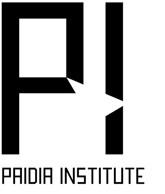Key principles:
Paidia1 Institute e. V. (PI) is envisioned as an evolvable structure providing a flexible framework for artistic, academic and administrative activities in a field of playable systems, addressing them as both a distinctive technique and a significant social and cultural phenomenon. We focus on a play as a core strategy enabling a transition from restrictive-static or chaotic-anarchic to paidiatic states, which is also a key element in fostering spontaneous creativity and collaboration.
Play.The act of play is one of the self-justifiable functional capacities of being—playing subject experiences totality of (played) reality. Humans never stop playing, however type of play evolves dramatically from a “free-play” in an early childhood to reglamented engagements in the later years. Paidia turns into ludus which, in turn, inevitably leads to archos—forming a complete path from exploratory improvisations to manifestations of canon. Variety and versatility of play structures provide an extremely fertile opportunity for acutely relevant research and creative projects.
Creativity. Ability to play is a primary condition of creativity which is one of a key dicta of contemporary, so called “post-industrial” political discourse, coagulating lately into policies of Lisbon2010 and subsequently serving as a formative strategy of the ideology of creative economy. Ideology itself—as an act of denomination—shares its semantic anatomy with play, ranging from a flexible system of widely accepted values to a rigid, bipolar structure of propaganda. Development of awareness and sensitivity to concealed forms of play rooted in most of the aspects of public and private lives and enhancement of ability to create socially and/or aesthetically active playable systems is one of our primary targets.
Technology. While converging on play we also desire to address the role of téchnē as it manifests itself in play as well as in a broader artistic and social context. Researching, recreating, and reflecting upon technical systems especially the ones that effectively shape current social structure is our thematic terrain and our modus operandi. Technocultural milieu is being subjected to the demands and desires of the market and exploited as a fertile ground for ideology of creative industries. Casting a critical eye on the politics of interactivity and innovation and fostering creative practices leading to socially responsible and original usage of technology is a necessary stand in order to preclude an otherwise inevitable slide into commodification of the mind. Technique is a key articulative circumstance of culture, however techne is being routinely opposed to ethos—an unfortunate circumstance indicating a rift in an existential fabric of society—instead of opposing technical to ethical we seek to compose them. Moreover, we believe that sensitive and responsive use of new technologies will promote development of new consumption-neutral social practices.
1 The name Paidia draws on an ancient Greek paideia (παιδεία), which means education or/and learning and is a tribute to the term paidia coined by Roger Caillois and referring to unstructured and spontaneous play.
